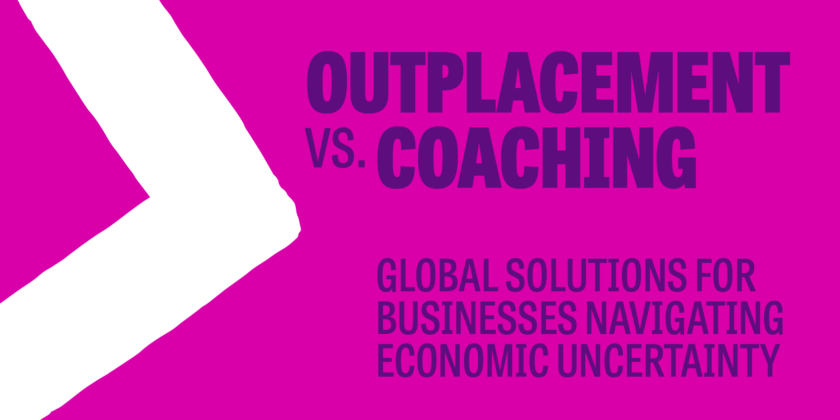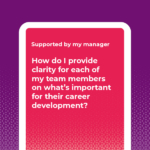Businesses around the world are facing economic headwinds, from lower growth projections to increased costs and the looming threat of restructuring. Whether it’s the UK’s National Insurance hikes, Europe’s energy crisis, or the global slowdown, organisations need robust solutions to support their workforce through these volatile times.
The Limitations of Traditional Outplacement Globally
Conventional outplacement services have long been the go-to solution for businesses navigating workforce reductions. These programs, often standardised across regions, typically involve a combination of:
- CV/resume writing assistance
- Interview preparation
- Job search support.
While valuable, outplacement services globally often fall short in several key areas:
Narrow focus
Traditional outplacement is laser-focused on the mechanics of finding a new job, neglecting the emotional and psychological impacts of job loss. This can leave departing employees feeling adrift and unsupported during a deeply challenging transition.
Lack of personalisation
One-size-fits-all outplacement programs struggle to address the unique needs and circumstances of each individual, regardless of their location or cultural background.
Short-term outlook
Outplacement services are typically time-limited, providing support for only a few weeks or months. However, the process of recovering from job loss and finding new employment can take much longer, especially in volatile economic climates.
Limited future-readiness
Traditional outplacement typically lacks provisions for skills development beyond immediate job search tasks, leaving departing employees underprepared for long-term career growth in an evolving job market. This can be especially limiting during periods of economic volatility, when new skills and adaptability are essential to securing meaningful, sustainable employment.
The Power of Coaching-Based Solutions
In our contrasting view, we believe that coaching-based approaches offer a more holistic and personalised solution for businesses and their employees. By focusing on the individual’s needs, goals, and overall well-being, coaching can provide a more meaningful and impactful experience.
As a UK-headquartered firm with a global reach, our coaching-based outplacement services go beyond the traditional model:
Emotional support
Coaching places emotional well-being at the heart of the process. Coaches offer a compassionate space for individuals to address the emotional fallout of job loss, helping them cultivate resilience, rebuild confidence, and move forward with a positive outlook.
Our coaches help departing employees process the emotions associated with job loss, develop coping strategies, and cultivate a positive mindset for the next chapter.
Tailored guidance
Our coaches work closely with each individual to identify their unique strengths, transferable skills, and career aspirations, helping them navigate the job market effectively in their local or global context.
Our coaching model extends beyond job search mechanics, enabling employees to build self-awareness, identify transferable skills, and align their career goals with personal strengths. This shift from a purely transactional approach to one rooted in self-discovery can empower employees with career clarity and purpose.
Ongoing engagement
Our coaching relationships can extend beyond the initial transition period, providing long-term support and accountability as employees embark on their new professional journeys.
We continue supporting employees well beyond their initial job search. Through ongoing coaching, employees cultivate adaptability and a growth mindset, which are critical to long-term career success in an uncertain global economy.
Upskilling and reskilling
We have also provided training and development opportunities to help employees acquire new skills, enhancing their employability in the evolving global job market.
Our coaches and facilitators focus on future-readiness by identifying and addressing skill gaps relevant to the current and future job market. By providing tailored upskilling and reskilling opportunities, we equip employees to remain competitive and to proactively shape their career paths in an evolving landscape.
Embracing Coaching-Based Outplacement Globally
In today’s challenging economic landscape, where difficult workforce decisions are increasingly common, coaching-based outplacement offers clear advantages over traditional models. By focusing on the emotional well-being and long-term success of departing employees, coaching not only supports individuals but also strengthens organisational reputation, reduces the risk of legal complications, and fosters goodwill within the community.
Coaching-based outplacement has been shown to be more impactful than traditional outplacement services, especially in situations where employees face redundancy.
82% of job seekers who participated in coaching-based outplacement found employment within six months, compared to lower rates for those in traditional services without personalised support.
Right Management
At Let’s Talk Talent, we believe that coaching affirms an organisation’s commitment to the holistic well-being of its people, addressing both their personal and professional needs. This empathy-driven approach helps companies maintain positive relationships with former employees, creating a network of advocates who leave with a lasting sense of respect and support.
As a globally connected world continues to shape the job market, a coaching-based model is uniquely suited to address the diverse needs of today’s workforce. Our coaches provide culturally sensitive guidance tailored to each employee’s background, making career transitions smoother and more meaningful across different regions and cultures.
Ultimately, coaching-based outplacement goes beyond immediate job placement. It prepares employees with the skills, resilience, and adaptability to succeed in an uncertain job market, enabling them to thrive in future roles and bring value to their new organisations. This future-focused approach benefits both the individuals navigating change and the organisations committed to responsible, people-centred transitions.
Don’t Forget to Support Your Internal Team!
While much attention understandably goes to those directly affected by redundancy, it’s crucial not to overlook the employees who remain. These “survivors” often face a range of challenges that can impact morale, productivity, and engagement if left unaddressed, of which coaching could also support.
Survivor’s guilt
Many remaining employees experience “survivor’s guilt,” feeling conflicted or even guilty about retaining their jobs while colleagues depart. This emotional weight can reduce morale and affect mental well-being, potentially diminishing their engagement and productivity.
Increased workload and pressure
With fewer team members, responsibilities often intensify for those who remain. This increased workload can lead to burnout, particularly if expectations aren’t recalibrated to reflect the reduced team size and resources.
Job insecurity
Even if their jobs are safe for now, remaining employees may worry about the company’s stability and their future within it. This job insecurity can create a distracting undercurrent of anxiety that affects focus, performance, and long-term commitment.
Trust and culture impact
Redundancies can disrupt workplace trust and weaken the sense of psychological safety within the team. Remaining employees might fear being next, or they may become wary of leadership’s decisions, leading to a less open and collaborative culture.
Motivation and morale
Seeing colleagues leave can impact team spirit, leaving survivors feeling disheartened or even resentful. Rebuilding motivation requires careful attention to their emotional needs, clear communication, and opportunities to re-engage.
In conclusion
As businesses around the world navigate the complexities of the current economic climate, embracing coaching-based outplacement services offers a compassionate, personalised, and impactful way to support employees through challenging transitions. By prioritising the human element for both departing employees and those remaining, organisations can create a culture of resilience, trust, and engagement. This comprehensive approach not only helps individuals rebuild and refocus but also strengthens the organisation as a whole. Emerging from these challenges, companies can build a more loyal, adaptable, and committed global workforce, well-poised for long-term success.
To learn more about our cost effective and scalable coaching offering, book a meeting with the team to discuss how we can support you in more detail!



